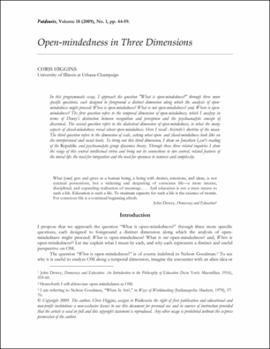| dc.contributor.author | Higgins, Chris | |
| dc.date.accessioned | 2016-02-25T19:13:04Z | |
| dc.date.available | 2016-02-25T19:13:04Z | |
| dc.date.issued | 2009 | |
| dc.identifier.uri | https://hdl.handle.net/11244/31805 | |
| dc.description.abstract | In this programmatic essay, I approach the question "What is open-mindedness?" through three more specific questions, each designed to foreground a distinct dimension along which the analysis of open-mindedness might proceed: When is open-mindedness? What is not open-mindedness? and, Where is open-mindedness? The first question refers to the temporal dimension of open-mindedness, which I analyze in terms of Dewey’s distinction between recognition and perception and the psychoanalytic concept of disavowal. The second question refers to the dialectical dimension of open-mindedness, to what the many aspects of closed-mindedness reveal about open-mindedness. Here I recall Aristotle’s doctrine of the mean. The third question refers to the dimension of scale, asking what open- and closed-mindedness look like on the interpersonal and social levels. To bring out this third dimension, I draw on Jonathan Lear's reading of the Republic and psychoanalytic group dynamics theory. Through these three related inquiries I show the range of this central intellectual virtue and bring out its connections to two central, related features of the moral life: the need for integration and the need for openness to newness and complexity. | en_US |
| dc.language | en_US | en_US |
| dc.relation.uri | http://journals.sfu.ca/pie/index.php/pie/article/view/198/128 | |
| dc.subject | Education, Philosophy of. | en_US |
| dc.subject | Philosophy. | en_US |
| dc.title | Open-mindedness in Three Dimensions | en_US |
| dc.type | Article | en_US |
| dc.description.peerreview | Yes | en_US |
| dc.description.peerreviewnotes | Peer review in Philosophical Inquiry in Education is designed to ensure that the essays published fully reflect the scholarly standards of analytic and critical assessment. Assuming that they meet the minimum quality standards of the journal, manuscripts are reviewed according to the following criteria: significance of ideas treated, creativity and clarity of thought, consideration of theoretical understanding, inclusion of relevant scholarly literature, strength of arguments, insightfulness of analysis and interpretation, treatment of counter-arguments, adequacy of writing style, and application of findings. Philosophical Inquiry in Education accepts articles spanning a wide range of interests and viewpoints in education, as long as they are written in the manner and style of critical inquiry, reflection, exposition, interpretation, debate, and argumentation. While empirical research data are not barred from articles, Philosophical Inquiry in Education gives preference to conceptual, phenomenological, hermeneutic, and heuristic methodologies. Each submission is reviewed through a double-blind review process. Typically, two or three reviewers review each article. Based on the reviewers’ evaluation and recommendation, the Editor makes the final decision. | en_US |
| dc.subject.keywords | open-mindedness; intellectual virtue; integrity; continuity; disavowal; group as a whole | |
| dcterms.bibliographicCitation | Higgings, C. (2009). Open-mindedness in three dimensions. Paideusis, 18(1), 44-59. | |
